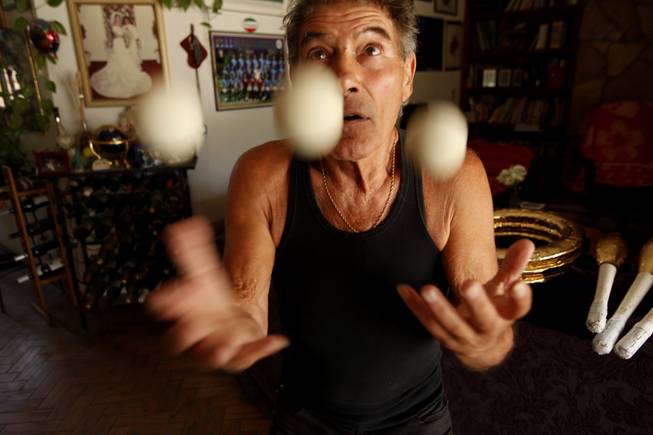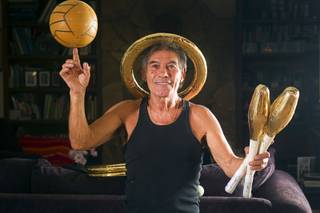
Genaro Molina/Los Angeles Times
Juggler Nino Frediani, 73, practices his craft in his Las Vegas home on August 23, 2013. Frediani, who has been legally blind since childhood, is considered one of the world’s fastest jugglers. He has been rehearsing for the show, “Unstoppable.”
Wednesday, Sept. 4, 2013 | 2 a.m.
Nino Frediani stands in his kitchen, ready for an impromptu demonstration of his craft: throwing things into the air with controlled abandon.
“This is how a normal juggler does it,” he says, launching three small yellow balls above his head.
But 73-year-old Frediani is no normal juggler. After a few rotations, he tosses one ball almost to the ceiling and misses its return. It hits the floor and rolls under the table.
“Now, this is how I do it,” he says.
He starts again. This time the balls remain only inches from his grasp, their orbits fast and tight, almost dizzying. Suddenly, he grabs them all at once, with a satisfied smile that says, “I’ve done it again. I’ve beaten the odds.”
For decades, Frediani carried a secret as he traveled across Europe and Africa with an act that earned him acclaim as the world’s fastest juggler. Since 1980, he’s performed on small stages around Las Vegas — tossing rings, knives and torches that could easily slice an arm or burn a leg. Yet, he stubbornly refused to tell either his employers or audiences the truth.
He’s legally blind.
Born with chronic dystrophy of the optic nerve, he cannot drive and follows a mnemonic system to recall the location of objects at home — a razor in the bathroom or the wine opener in the kitchen — because things even a few feet from his face fade into a blur.
But he juggles. At just 5-foot-4 and 130 pounds, Frediani uses the same near-fathomless personal drive — some might call it stubbornness — that led him to learn five languages despite having no formal education.
He hails from a circus family with roots, he claims, dating back to Francesco Frediani, a troubadour born in Florence in 1650. The young Nino Frediani’s decision to pursue juggling as a profession caused a rift with his father, Augusto, himself a successful big-top acrobat who insisted that jugglers should be able to see.
Twirling rocks as a 6-year-old, the boy found ways to compensate for his lack of vision. He committed new surroundings to memory, learned to recognize friends and co-workers by their voices and used gold-colored props in his act so he could see their glint under the bright lights.
What he would never do is bill himself as “The Blind Juggler.”
“I never wanted to be treated as a handicapped person,” he said. “I don’t act blind. It comes from my circus roots — we’re all pretty tough people. I wanted to be known as a fast juggler, not a blind one.”
Even when Frediani went public about his blindness a few years ago, he resisted billing his act in that light despite pressure from friends. Everyone in Las Vegas has a shtick, they argued. But Frediani didn’t want anyone buying tickets out of pity.
Then, last month, after several years of doing only charity events, Frediani appeared in a new off-Strip variety show, “Unstoppable,” that took him in a new direction: It included stage material about his lack of sight. For Frediani, it meant turning the gig from mere theater into personal catharsis.
“Who would have guessed that talking about my sight problems would prove to be the best thing?” he said. “I don’t know why I waited so long to say it: ‘I am legally blind.’”
A high-flying start
Frediani says he was born in the circus — literally.
His father, the high man in a three-acrobat column on horseback without safety net or harness, was performing in Lisbon, Portugal, in 1940 with his pregnant acrobat wife when she collapsed in the ring.
“What’s going on?” his father called out.
“I think your son is coming,” she replied.
Frediani was born in a dressing room.
The boy had immediate sight problems, but optometry was in its infancy and he was never properly diagnosed. Doctors merely said he was nearsighted.
By age 10, Frediani was an emerging juggler, but his father discouraged him when he realized his son couldn’t see the props as they sailed back down from where he tossed them, high in the air.
“He said ‘Nino, you’ve got the perfect shape for a tumbler. Do more tumbling,’” Frediani said.
But he refused to quit. He developed his own close-to-the-hands style, often performing in bars with ceilings too low for traditional acts, so the owners would say, “Let’s bring in the blind juggler.”
Frediani hated the moniker and pledged he’d never perform under that billing.
He soon developed a stunt: The audience would toss rings that he would catch around his neck. He juggled atop the Eiffel Tower, in Rome’s Coliseum and, once, underwater. But he still longed for his father’s approval.
Years later, Augusto reluctantly came to see his son perform. After the show, he walked up and extended his hand.
“He said, ‘You made me very proud,’” Frediani said. “That was it. He never came back again.”
His secret was often nearly revealed. In the 1960s, Frediani performed for French President Georges Pompidou and his wife. As performers lined up to greet the first couple, Frediani bent to kiss the hand of who he thought was the first lady. Then he realized it was Pompidou himself.
The president quickly withdrew his hand, Frediani recalled.
“He said, ‘The show’s over,’" Frediani said. "He thought I was making fun of him.”
In 1980, after Frediani moved to Las Vegas, he finally revealed his secret to a show dancer. He asked Pamela Sullivan to come to his dressing room and read him a stack of love letters, admitting he couldn’t see the words.
One by one, Sullivan watched him hold the envelopes close to his face to determine their senders.
“He’s a man with great pride and character,” she said. “He doesn’t have to do this — he has the money to retire. But juggling is in his blood. He just cannot stop doing it and still be happy.”
In the spotlight
It’s the afternoon rehearsal before Frediani’s one-night stand at the 95-seat Onyx Theatre, located along a downbeat stretch of East Sahara Avenue, next to a fetish clothing store.
Front man Victor Moea gets the show going.
“Ladies and gentleman,” he says in a rich baritone, “my partner is late again. Don’t worry though. He’s 73 and legally blind, but he’ll find his way.”
Suddenly, Frediani is there with his props and theatrical blast of gray hair, looking right at home on the place he loves most: the juggling stage.
Over two hours, Moea, 70, and two other performers sing show tunes. There is a 79-year-old magician named Zarrin. But Frediani is the star, tossing rings, pins, tennis balls and soccer balls — some behind his back others on a darkened stage — like a performer one-third his age.
The performance is not without its flaws. Like in a high school play, there are flubbed cues, and Frediani drops several props. But in the end, the audience gives the troupe a roaring ovation.
Denise Rose, a singer in the review, just recently learned the juggler’s old secret.
“You’d just never guess,” she said. “His eyes are so clear and bright.”
Frediani gently put his hand on her arm.
“Keep thinking that way,” he said softly.


Join the Discussion:
Check this out for a full explanation of our conversion to the LiveFyre commenting system and instructions on how to sign up for an account.
Full comments policy